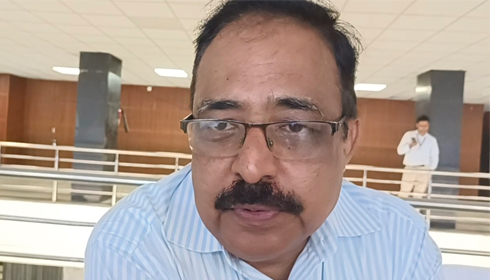
In-Depth Look at Friedreich’s Ataxia: Causes, Challenges & Hope for Future
It can be distressing for parents to see their child suddenly walking with an imbalance, fearing it may indicate a serious health issue like Friedreich’s Ataxia (FRDA). FRDA is a rare, inherited disorder that affects the nervous system and muscles, occurring in about one in 50,000 people. Despite its rarity, there is hope for those affected, thanks to the efforts of Dr. Achal Srivastava, a renowned neurologist and professor at AIIMS, New Delhi, who is raising awareness about this disease and working to have it recognized as a rare disease.
Dr. Srivastava has an impressive background with an MD and DM in Neurology, and he currently leads Unit 3 in the Department of Neurology at AIIMS. With 255 indexed publications, 20 book chapters, and 140 indexed abstracts, his expertise in movement disorders, especially ataxias and clinical neurophysiology, is well established. Over his career, he has received over 30 paper awards and multiple prestigious fellowships. He serves as the Treasurer of the Indian Academy of Neurology and Secretary of both the Delhi Neurological Association and the Nerve Muscle Society.
Friedreich’s Ataxia (FRDA) is a debilitating condition that poses significant challenges not only to the patients but also to their families. The early onset and progressive nature of the disease mean that children diagnosed with FRDA face a life that steadily becomes more restricted. The mutation in the FXN gene, responsible for producing the protein frataxin, leads to a cascade of health issues primarily affecting the nervous system and muscles. Frataxin is crucial for the proper functioning of mitochondria, the energy-producing parts of cells, and its deficiency results in the degeneration of nerve and muscle cells.
Dr. Achal Srivastava's work is particularly important in a country like India, where awareness and resources for rare diseases are limited. His extensive research and clinical work have brought attention to FRDA and highlighted the need for it to be recognized as a rare disease. Such recognition is crucial as it can lead to better support systems, funding for research, and access to treatments.
One of the major hurdles in managing FRDA is the lack of accessible treatment options. The recent approval of Omaveloxolone in the U.S. and Europe marks a significant advancement in the treatment of FRDA. Omaveloxolone works by reducing oxidative stress and inflammation, thereby slowing the disease’s progression and improving motor function in patients.
However, the exorbitant cost of the drug and its unavailability in India create significant barriers. Dr. Srivastava and his team are advocating for the inclusion of FRDA in the list of rare diseases recognized by the Indian government. This step could potentially facilitate the import and subsidization of necessary medications, making them more accessible to patients.
DTMT: Please tell us something about FRDA.
Dr. Srivastava: Friedreich’s Ataxia (FRDA) is a rare, inherited disorder affecting the nervous system and muscles. It typically begins between the ages of five and fifteen and progresses from body imbalance to muscle weakness, often leading to wheelchair dependence and eventually becoming bedridden. Some patients also develop heart disease.
DTMT: What are the causes of FRDA?
Dr. Srivastava: FRDA is caused by mutations in the FXN gene, leading to reduced levels of the protein frataxin. This deficiency causes nerve and muscle cell degeneration, resulting in progressively worsening symptoms. Most individuals eventually require a wheelchair and may face life-threatening complications like cardiomyopathy and diabetes.
DTMT: Can you tell us about your collaboration with the Friedreich’s Ataxia Research Alliance, USA?
Dr. Srivastava: The I have had the honour of working at AIIMS with the Friedreich's Ataxia Research Alliance (FARA), a well-known advocacy organisation with its headquarters in the United States that is heavily active in supporting research for this difficult condition. A keystone of my work, this partnership has made possible a priceless worldwide sharing of information and resources. Because it unites several viewpoints and areas of knowledge that can result in ground-breaking findings, such international collaboration is essential for progressing research.
Together, we have effectively enrolled almost 150 patients in our AIIMS research. With this large group, we may investigate different therapy modalities and track the development of Friedreich's ataxia in detail. The path of every patient adds important information that improves our knowledge of the illness and enables us to see trends and possible treatments that may not be seen in smaller studies.
DTMT: What is your role in this initiative?
Dr. Srivastava: I have been researching and working on FRDA for the last 20 to 25 years. My initiative focuses on providing advantages to patients, enhancing their productivity, and promoting further research on FRDA, particularly regarding drug effectiveness and genetic factors.
DTMT: How many patients have you seen with this disease so far?
Dr. Srivastava: We have seen a total of 150 FRDA patients at AIIMS, which underscores its rarity.
DTMT: What do you say about the quality of life for patients suffering from this disease?
Dr. Srivastava: Initially, patients may not have significant issues, but the disease progresses between five and fifteen years of age. They eventually become wheelchair-bound and bedridden, depending on the genetic load (GAA) of the disease.
DTMT: What are the available treatment and diagnostic options for FRDA?
Dr. Srivastava: FRDA is first diagnosed through clinical evaluation and genetic testing. Currently, a drug called Omaveloxolone (Omav) has been approved in the U.S. and Europe, but it is not available in India. The cost of this drug is prohibitively expensive, around Rs 32 lakh per month, making it inaccessible for most patients in India. We are working to have FRDA classified as a rare disease to facilitate better access to treatment.
DTMT: When should parents be alert about this disease?
Dr. Srivastava: Parents should be vigilant if there is a family history of the disease. Early signs include imbalance while walking, and they should consult a neurologist immediately if such symptoms appear.
The quality of life for FRDA patients is a significant matter of concern that needs to be resolved.